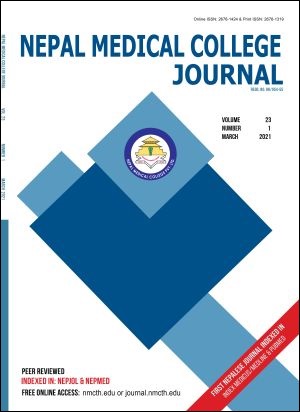Seroprevalence Toxoplasma Infection among HIV/AIDS Patients in Kathmandu, Nepal
DOI:
https://doi.org/10.3126/nmcj.v23i1.36236Keywords:
Toxoplasma antibody, IgG, IgM, HIV/AIDS patients, NepalAbstract
Toxoplasmosis is a zoonotic disease caused by Toxoplasma gondii affecting about one third of the world’s population. It can be asymptomatic to fatal toxoplasmic encephalitis depending on the immune status of infected individuals. Among HIV/AIDS patients, it usually manifest as life-threatening condition. We, therefore, studied the seroprevalence of T. gondii infection among HIV/AIDS patients in Nepal and this report constitutes the first report from Nepal. A total of 45 HIV/AIDS patients were included in this study. The serum samples collected and stored at -20°C were tested for Toxoplasma IgG and IgM antibodies at National Public Health Laboratory, Teku, Kathmandu using Snibe Maglumi 1000 Fully Automated Immunoassay Analyzer and the results were expressed in AU/ml. The blood put into the EDTA tube was used for CD4 count using BD FACS Calibur Flow Cytometer. In this study, 33.3% (15/45) HIV infected patients were seropositive for anti-T. gondii IgG. However, none of them were positive to anti- T. gondii IgM. Most of the patients (36 out of 45 patients) had <200/mm3 CD4 cell count. However, out of them 36.1% (13/36) were seropositive to anti-T. gondii IgG whereas 22.2% (2/9) patients with ≥200 CD4 cell counts had Toxoplasma antibodies (p >0.05).
Downloads
Downloads
Published
How to Cite
Issue
Section
License
This license enables reusers to distribute, remix, adapt, and build upon the material in any medium or format, so long as attribution is given to the creator. The license allows for commercial use.




